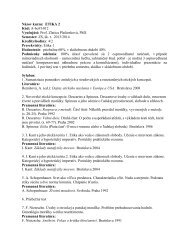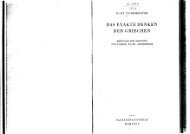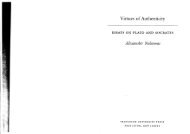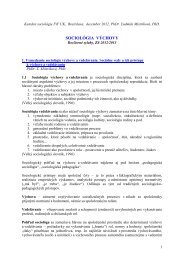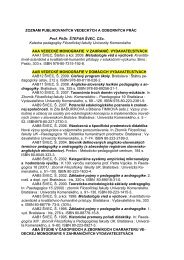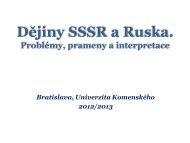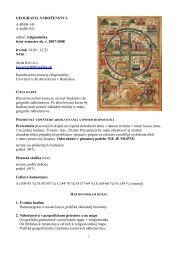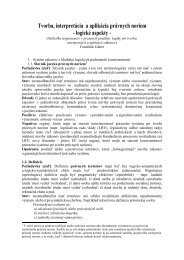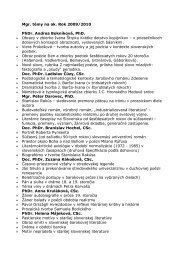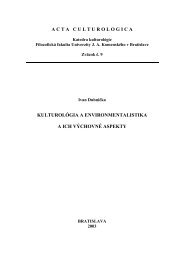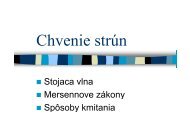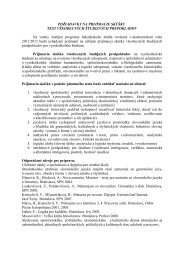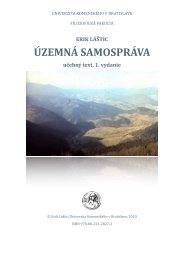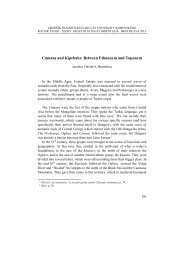Department of British and American Studies at the - Univerzita ...
Department of British and American Studies at the - Univerzita ...
Department of British and American Studies at the - Univerzita ...
You also want an ePaper? Increase the reach of your titles
YUMPU automatically turns print PDFs into web optimized ePapers that Google loves.
squire Western, a typical early 18 th century Tory – lackadaisical, given to huntin‘, shootin‘<br />
<strong>and</strong> culinary pleasures, <strong>and</strong> speaking openly his mind. In accordance with his name, he<br />
frequently breaks out in <strong>the</strong> Somerset dialect <strong>of</strong> <strong>the</strong> West Country, which is apt to erupt in<br />
moments <strong>of</strong> intense passion. His language is forceful <strong>and</strong> contains numerous expressions<br />
which until recently used to be replaced in English fiction by dashes. Fielding reproduces <strong>the</strong><br />
variants <strong>of</strong> pronunci<strong>at</strong>ion (th<strong>of</strong> instead <strong>of</strong> though, oum instead <strong>of</strong> <strong>of</strong> <strong>the</strong>m, initial z- instead <strong>of</strong><br />
s-, <strong>and</strong> v- instead <strong>of</strong> f-, – volks, vorty instead <strong>of</strong> folks, forty &c.) as well as grammar (<strong>the</strong>y be<br />
instead <strong>of</strong> <strong>the</strong>y are, zeed instead <strong>of</strong> saw). This linguistic portrait has several functions: first, it<br />
serves as a source <strong>of</strong> comedy; second, it serves as a means <strong>of</strong> localis<strong>at</strong>ion, placing <strong>the</strong><br />
character in a concrete geographical scene; <strong>and</strong> third, in a novel exploiting <strong>the</strong> contrast<br />
between <strong>the</strong> elegant Whig London <strong>and</strong> rustic Tory provinces, <strong>the</strong> rambunctious character <strong>of</strong><br />
<strong>the</strong> squire‘s language underlines his bond with <strong>the</strong> circle <strong>of</strong> provincial magn<strong>at</strong>es.<br />
This line <strong>of</strong> characteris<strong>at</strong>ion by dialect culmin<strong>at</strong>es with Dickens. Sam Weller remains<br />
carved in our memory as an essentially comical figure <strong>and</strong> his cockney is an inseparable part<br />
<strong>of</strong> his portrait. His comicality, however, is not <strong>of</strong> <strong>the</strong> cheap kind – we laugh with him r<strong>at</strong>her<br />
than <strong>at</strong> him. He is witty, has a n<strong>at</strong>ural gift <strong>of</strong> looking <strong>at</strong> things in his own way, <strong>and</strong> find<br />
solutions – also in his own way. (In many respects he reminds us <strong>of</strong> Josef Ńvejk – <strong>the</strong>y are<br />
both children <strong>of</strong> a big city, with little formal educ<strong>at</strong>ion but a lot <strong>of</strong> n<strong>at</strong>ural intelligence, <strong>and</strong><br />
life taught <strong>the</strong>m how to find a way out <strong>of</strong> any situ<strong>at</strong>ion.) It is worth noting th<strong>at</strong> although his<br />
dialect adds to <strong>the</strong> comic effect <strong>of</strong> his remarks – transcribed into st<strong>and</strong>ard English <strong>the</strong>y would<br />
lose something <strong>of</strong> <strong>the</strong>ir earthiness – it is, never<strong>the</strong>less, not <strong>the</strong> source <strong>of</strong> <strong>the</strong>ir humour: <strong>the</strong>y are<br />
humorous in <strong>the</strong>ir own right. After all, he gave his name to Wellerisms, those pronouncements<br />
converting a well-known saying to its opposite by adding an idiosyncr<strong>at</strong>ic tag: ―It‘s over, <strong>and</strong><br />
can‘t be helped, <strong>and</strong> th<strong>at</strong>‘s one consol<strong>at</strong>ion, as <strong>the</strong>y always say in Turkey, ven <strong>the</strong>y cuts <strong>the</strong><br />
wrong man‘s head <strong>of</strong>f.‖<br />
In l<strong>at</strong>er works Dickens modifies his technique <strong>and</strong> cre<strong>at</strong>es a more complex structure.<br />
Although in The Pickwick Club it is always possible to distinguish between <strong>the</strong> author‘s<br />
speech <strong>and</strong> th<strong>at</strong> <strong>of</strong> <strong>the</strong> characters, in l<strong>at</strong>er works colloquial diction – including dialect –<br />
infiltr<strong>at</strong>es <strong>the</strong> authorial level through <strong>the</strong> various forms <strong>of</strong> indirect speech. While with Sam<br />
Weller dialect is an integral part <strong>of</strong> <strong>the</strong> comic effect, in Dickens‘s m<strong>at</strong>ure works it oper<strong>at</strong>es as<br />
a means <strong>of</strong> characteris<strong>at</strong>ion without necessarily <strong>at</strong>tempting <strong>at</strong> comedy. It is also worth<br />
noticing (e.g., in <strong>the</strong> above quot<strong>at</strong>ion <strong>of</strong> Sam Weller) th<strong>at</strong> Dickens does not aim <strong>at</strong> a<br />
painstaking reproduction <strong>of</strong> pronunci<strong>at</strong>ion <strong>and</strong> grammar, being r<strong>at</strong>her s<strong>at</strong>isfied with setting a<br />
few impressionistic accents in a position where <strong>the</strong>y count.<br />
Slovak <strong>Studies</strong> in English, Vol. 3, 2011 – Identity in Intercultural Communic<strong>at</strong>ion<br />
37




